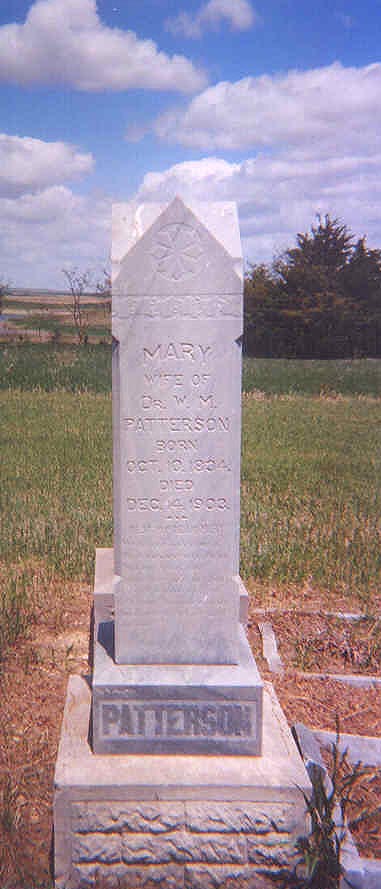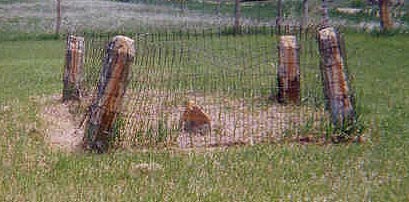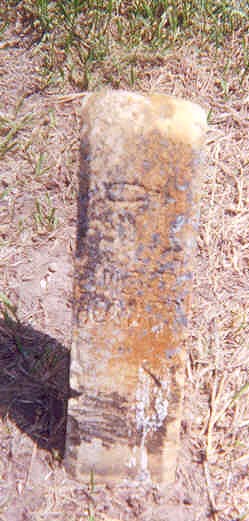Patterson Cemetery
 Patterson
was established by Dr. William M. Patterson, a country physician in the pioneer
days, who is buried there with his wife and an infant, J.B.
Patterson
was established by Dr. William M. Patterson, a country physician in the pioneer
days, who is buried there with his wife and an infant, J.B.
 Patterson
was established by Dr. William M. Patterson, a country physician in the pioneer
days, who is buried there with his wife and an infant, J.B.
Patterson
was established by Dr. William M. Patterson, a country physician in the pioneer
days, who is buried there with his wife and an infant, J.B.
Patterson's stone is inscribed:
I have fought a
good fight, I
have
finished my course, I have
kept the faith
Mrs.
Patterson's stone reads:
Rest My Dear Mary
We grieve and
mourn
that you are not with us,
but our grief and
mourning will not
comp
are in the least degree
with your kindness and
goodness as a wife
and mother
The life of a country doctor was not an easy one. In 1902, Dr. Patterson wrote a letter to the Lincoln Republican, pleading that his patients not longer call him out during the night. At more than 70 years of age, he just wasn't able to make overnight calls anymore.
There are only a few stones in the cemetery besides those of the Patterson family, and those stones were all homemade. Worse, they are made of the native limestone post rock, which was excellent for fenceposts but not as desirable for retaining carving and lettering.
 Luckily
some records survive for the cemetery. According to those, there are two Horner
children buried here, as well as the children of John Bunker, whose lot still
has the limestone fence posts and wire around it (how many children are buried
there and when they died is not recorded).
Luckily
some records survive for the cemetery. According to those, there are two Horner
children buried here, as well as the children of John Bunker, whose lot still
has the limestone fence posts and wire around it (how many children are buried
there and when they died is not recorded).
Also in the records are young man named Butterfield, son of Acton Butterfield. There may also be a Mr. Ritchie buried here, a woman named Werty, and children named Dickinson.
 One
of the Horner children's graves is referred to as having a "watermelon marker"
because he died after eating at a watermelon feed.
One
of the Horner children's graves is referred to as having a "watermelon marker"
because he died after eating at a watermelon feed.
I believe this is the
marker and that the watermelon is that oblong object crudely carved into the top
of the stone so many years ago.
Lincoln Republican, March 13, 1902
Editors Republican Will you kindly allow me to use a small space in your paper? Owing to the fact of the doctors northeast of my place having quit practicing medicine there is quite a strip of territory that is calling on me for medical help, and in order to save valuable time I wish to say through your paper that I cannot possibly handle the new territory. I am not able to respond to the urgent calls of my old customers. And to them I wish to say that owing to may age (I am now passing seventy years) I am compelled to decline all long calls, or drives. Those living on the extreme outskirts of my territory will please not send for me. I frequently come in quite late in the day and am told by my family that there is a call for me to go eight or 10 miles to come at once and not being able to go but rather have to go to bed, it makes me feel badly knowing that you expect me to come. For many years I have cheerfuly tried to serve you, but now it is an impossibility to me to do so longer.
Yet I will say that in extreme cases, where the drive can be made in daylight, I would try to serve you. But bear in mind I cannot go out at nights. Your nearby towns are well supplied with young doctors, able and efficient. One year ago I had decided to quit the practice entirely but owing to the entreaties and wishes of my neighbors I have decided to try and serve them yet a little while. But I wish it distinctly understood that my practice must be confined to an area of five or six miles and I cannot go out of nights. Just as soon as a few more young doctors get mobiles [automobiles] my practice will be confined to my own family exclusively. My object in writing this is that it may save valuable time. I would to God that I was young again. How cheerfully I would serve you. This is to me is a sad reckoning, but a kind Providence wills it and I submit. I have been with you so long that to me it is a sad parting. How grateful I feel to you all. You have stood by me so well. To your dear children that I have cared for from their infancy say to them that I love all of them.
Dr. Patterson